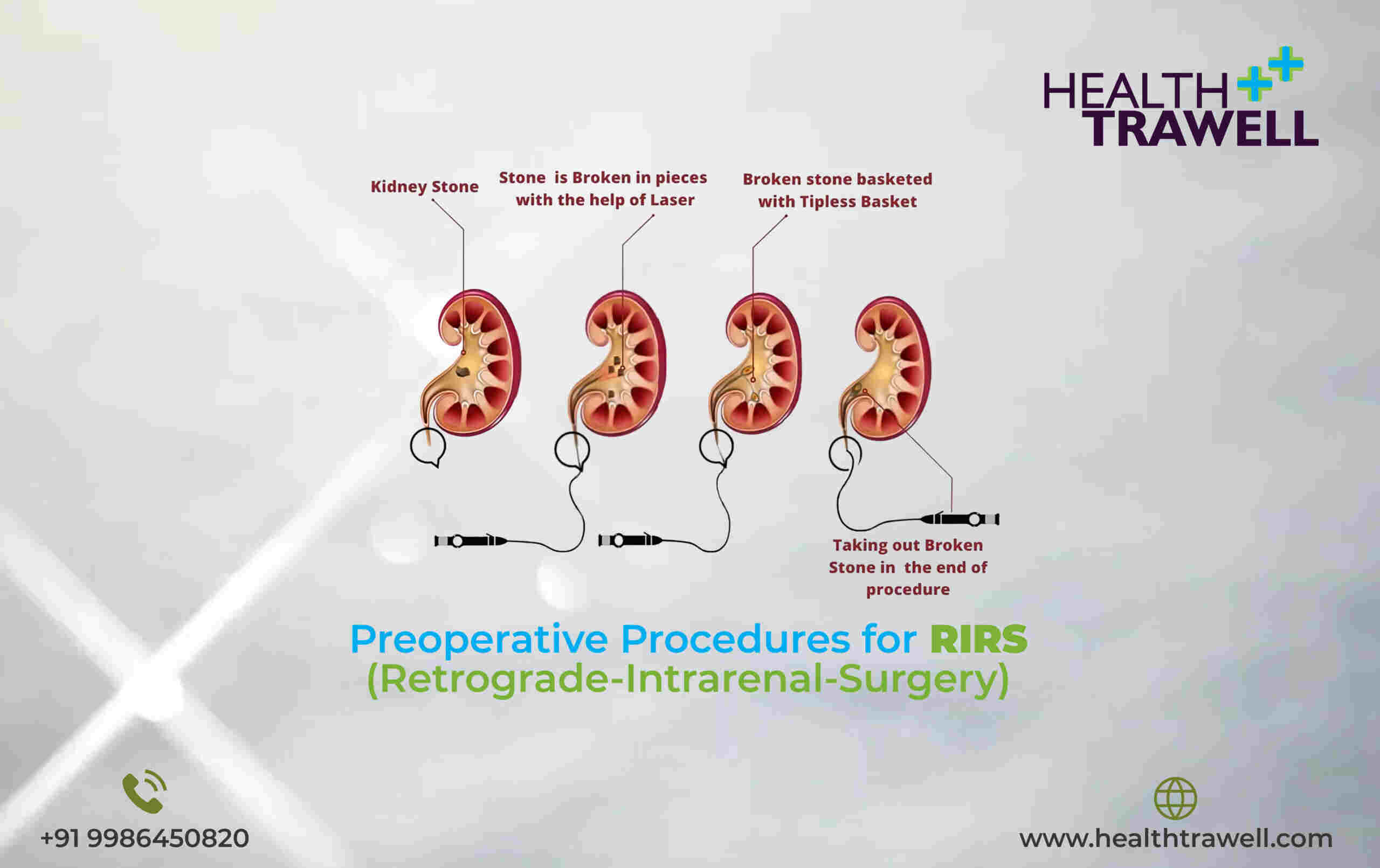Check Out the Attractive RIRS Surgery Cost in India along with Best HealthCare

What Happens During the RIRS Procedure?
Benefits of Retrograde Intrarenal Surgery (RIRS):
RIRS Surgery Cost in India vs. Developed Regions
Get RIRS Surgery Done in India for Best Results!
Travelling to offshores for availing medical services can be a dainty experience if you choose India as your medical travel destination as it is about the pleasing healthcare services here while pleasing your pocket at the same time!
Retrograde-Intrarenal-Surgery (RIRS) is a minimally invasive surgical procedure used to treat kidney stones and other conditions affecting the inside of the kidney. RIRS surgery cost in India is quite pleasing so many foreign patients have been making India their medical travel destination of late.
Preoperative Procedures for RIRS
- Medical Evaluation: Before undergoing RIRS, the patient’s medical history, kidney function, and any preexisting conditions are assessed. Blood tests, urine tests, and imaging studies (such as CT scans) might be performed to determine the size, location, and number of kidney stones.
- Fasting & Medications: Depending on the medical evaluation, the patient might be instructed to fast for a certain period before the procedure. Medications, especially blood thinners, may need to be adjusted or temporarily stopped under medical supervision.
- Anaesthesia: RIRS is typically performed under general anaesthesia. An anaesthesiologist will administer the anaesthesia and monitor the patient’s vital signs throughout the procedure.
What Happens During the RIRS Procedure?
- Access to the Kidney: A thin, flexible instrument called a ureteroscope is inserted through the urethra and passed through the bladder and into the ureter to access the kidney.
- Navigation to the Kidney: The ureteroscope is guided up into the kidney where the surgeon can visualize the stone or affected area on a monitor.
- Stone Removal: Laser energy is used to break down the kidney stone into smaller fragments. The surgeon can then use various tools within the ureteroscope to grasp, remove, or push the fragments out of the body through the natural urinary passage.
- Stent Placement (Optional): In some cases, a temporary stent might be placed to ensure proper drainage and healing after the procedure. This stent is typically removed in a follow-up appointment.
Postoperative Care for RIRS
Postoperative care after Retrograde Intrarenal Surgery (RIRS) is crucial to ensure proper healing, prevent complications, and promote a smooth recovery. It is crucial for patients to closely follow their healthcare provider’s instructions and attend all follow-up appointments. If any complications, severe pain, fever, or other unusual symptoms arise, the patient should seek medical attention promptly. Every patient’s situation is unique, so individual postoperative care instructions may vary. Here is an outline of the typical postoperative care for RIRS:
- Recovery Room & Monitoring: After the procedure, the patient will be monitored in a recovery room until the effects of anaesthesia wear off and vital signs stabilize. This is usually a brief period during which medical staff will ensure the patient is awakening comfortably and their blood pressure, heart rate, and oxygen levels are stable.
- Pain Management: Pain & discomfort are common after RIRS. Pain medication(s) are usually prescribed for managing any such discomfort.
- Fluid Intake: Adequate fluid intake is important to help flush out any remaining stone fragments and prevent urinary tract infections. The patient is usually advised to drink plenty of water in the days following the procedure.
- Activity & Rest: While early ambulation (walking) is encouraged to prevent blood clots and promote circulation, the patient should also get sufficient rest. Keep away from any strenuous activities at least for some time.
- Diet: Depending on the patient’s condition, dietary recommendations might be given. Generally, a balanced diet with a focus on avoiding excessive sodium & protein is recommended.
- Stent Care (If Applicable): If a temporary stent was placed during the RIRS procedure, the patient should follow any stent-related care instructions provided by the surgeon. This might include guidelines for stent cleaning and managing any discomfort.
- Follow-Up Visits: Patients are required to schedule these appointments as they are significant for monitoring the patient’s healing process, removing stents if needed, and discussing any concerns/queries.
- Urinary Symptoms: Some patients might experience mild urinary symptoms such as frequency, urgency, or mild discomfort during urination. These symptoms should improve over time, but any severe or worsening symptoms should be reported to the healthcare provider.
- Medication: If prescribed, antibiotics or other medications should be taken as directed to prevent or treat any potential infections.
- Hygiene: Maintaining proper hygiene, especially around the genital area, is important to prevent infections.
- Avoiding Irritants: Patients should avoid substances that can irritate the urinary system, such as alcohol and caffeine.
Benefits of Retrograde Intrarenal Surgery (RIRS):
- Minimally Invasive: RIRS is a minimally invasive procedure, meaning it requires only small incisions or no incisions at all, reducing trauma to surrounding tissues.
- High Success Rate: RIRS has a high success rate in treating kidney stones & other kidney conditions, with relatively low complication rates.
- Shorter Recovery Time: The recovery time after RIRS is typically shorter compared to traditional open surgeries, allowing patients to return to their normal activities sooner.
- Reduced Pain: The minimally invasive nature of RIRS generally leads to less postoperative pain & discomfort.
- Minimal Scarring: Since RIRS involves small or no incisions, scarring is minimal.
RIRS Surgery Cost in India vs. Developed Regions
Medical costs can vary widely depending on factors such as the specific hospital, location, complexity of the case, and any additional medical services required. In general, medical procedures, including RIRS, tend to be more affordable in India compared to many other developed nations, such as the United States and European countries.
Get RIRS Surgery Done in India for Best Results!
It is important to note that healthcare costs can change over time, so it is highly recommended to contact trustworthy medical centres and consult with medical professionals to get the most accurate & up-to-date information regarding RIRS surgery cost in India and other developed nations. Additionally, considering insurance coverage & government healthcare policies in India has also impacted the overall cost of the procedure in a positive way, making India a luring option for many foreign patients. You can get in touch with the worthy team of Health Trawell and discuss with them about your options here in India as per your specific case.



